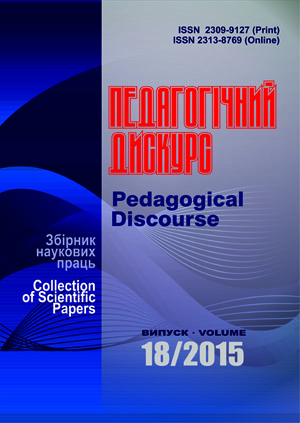The Essence of the Concept of «Responsibility»
Abstract
In the article the author illuminated the problem of interpretation of the term «responsibility» in the scientific literature. The researches of the main approaches to the definition of the concept of «responsibility» based on analyzing philosophical, psychological and pedagogical works, encyclopedias and reference books were held. The concept «responsibility» was clarified as a result of analysis of the sources of information.
The article illuminates the ideas of the necessity of forming socially conscious, competent personality of the modern teacher and one of the important qualities which provides it is responsibility. The author identified the indicators of teacher’s responsibility which include: moral maturity; friendly attitude to children, parents, co-workers; achieving the financial and professional success.
The opinions about the concept of «teacher in charge» through the disclosure of his actions «to give an answer to yourself», «to give an answer to another», «to give an answer to difficult situation», «to overcome the fear of liability» are generalized.
Downloads
References
Bekh I. D. Vykhovannia osobystosti : pidruch., Kyiv, Lybid, 2008, 848 p.
Vasyanovych H. P. Pedahohichna etyka : navch. posib., Kyiv, Akademvydav, 2011, 254 p.
Vasyanovych H. P. Moralno-pravova vidpovidalnist pedahoha (teoretyko-metodolohichnyi aspekt) : monohrafiia, Lviv, Lvivskyy derzh. finansovo-ekonom. in-t, 2002, 232 p.
Gerbart I. F. Obschaya pedagogika, vy’vedennaya iz celey vospitaniya, Gerbart I. F. Izbranny’e pedagogicheskie sochineniya, Moscow, Uchpedhyz, 1940, T. 1, pp. 179–188, 238–280.
Disterveg A. O. O samosoznanii uchitelya, Disterveg A. O. Izbranny’e pedagogicheskie sochineniya, Moscow, Gosuchpedgiz, 1956, pp. 309–320.
Etyka : navch. posib., V. O. Lozovoi, M. I. Panov, O. A. Stasevska ta in. ; za red. prof. V. O. Lozovoho, Kyiv, Yurinkom Inter, 2007, 227 p.
Kodzhaspirova G. M., Kodzhaspirov A. Yu. Pedagogicheskij slovar’ : dlya stud. vy’ssh. i sred. ped. ucheb. zavedenij, Moscow, Akademiya, 2001, 176 p.
Komenskij Ya. A. Labirint sveta i raj serdcza, Komenskij Ya. A. Izbranny’e pedagogicheskie sochineniya, Moscow, 1982, T. 1, pp. 178.
Kravchenko A. A. Arkhetyp uchytelia: ideia, obraz, vidpovidalnist : monohrafiia, Lviv, Liha-Pres, 2013, 421 p.
Platon. Gorgij, Platon. Sochineniya, Moscow, My’sl’, 1968, T. 1, pp. 354.
Smetanskyi M. I. Formuvannia social’noi vidpovidalnosti vchytelia, Vinnytsia, Vinnytskyi derzh. ped. in-t im. M. Kotsiubynskoho, 1993, 91 p.
Sovetskij e’nciklopedicheskij slovar’, A. M. Prokhorova, Moscow, Sovetskaya e’nciklopediya, 1985, 1600 p.
Spinoza B. E’tika, Spinoza B. Izbranny’e proizvedeniya, Moscow, Gos. izd-vo polit. lit-ry’, 1957, T. 1, p. 395.
Filosofskyi slovnyk, za red. V. I. Shynkaruka, Kyiv, Holovna redaktsiia Ukrainskoi Radianskoi Entsyklopedii Akademii nauk Ukrainskoi RSR, 1973, 598 p.

This work is licensed under a Creative Commons Attribution-NonCommercial-ShareAlike 4.0 International License.

















